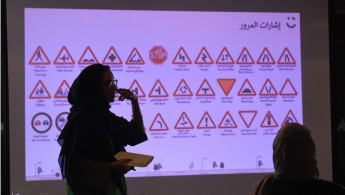Uber, Careem to hire female drivers for the first time in Saudi Arabia
Ride-hailing apps in Saudi Arabia are looking to hire female drivers for the first time following a decree issued last year by King Salman allowing women to finally apply for a driver's licence.
Months ahead of the decree's official implementation date, San Francisco-based Uber and Dubai-based Careem have started preparing plans to recruit female drivers.
Nearly 80 percent of Uber's Saudi passenger base are female, and 70 percent for its Dubai-based counterpart, Careem. The driving ban on women, and lack of public transport infrastructure means the applications are a lifeline for women in the kingdom.
Careem, a popular alternative to Uber in the Middle East and operating in 13 countries, began a series of 90-minute training sessions in Saudi cities Riyadh, Jeddah and Al Khobar. Saudi women who have foreign driving licences are able to attend.
Female employees in Careem's administrative positions are delivering training that include Saudi road laws, customer service techniques and operating the application's platform.
Careem has reportedly received thousands of applications already from Saudi women hoping to complete the training course. Upon completion, attendees receive a certificate of completion, officially joining Careem's team.
The Dubai-based company said that the female driver option will only be available to female passengers or families, to accommodate for cultural sensitives in the conservative Saudi society which frowns upon gender mixing.
Uber, meanwhile, has announced plans to open 'one stop shop' facilities dedicated to hiring future female chauffeurs.
"We will partner up with necessary stakeholders to facilitate the paperwork, training access, and access to vehicles, including access to driving schools run by third party partners," says Zeid Hreish, Uber's general manager in Saudi Arabia to CNN.
The kingdom announced in September that a long-standing prohibition on women from taking to the road would end next year, the only country to have such a ban in place.
Yet Saudi Arabia retains some of the world's most discriminatory laws against women, with restrictions on what they can wear and on traveling outside the country without the permission of male guardians.
A sweeping economic plan, dubbed "Vision 2030", has seen a number of new reforms pushed in the last year. The relaxing of social rules have been seen as a way of Crown Prince Mohammad bin Salman to appeal to Saudi youth as he embarks on a clampdown on all dissent in the country.
It is also viewed as an attempt to foster a more inviting environment for desperately needed foreign investors.





 Follow the Middle East's top stories in English at The New Arab on Google News
Follow the Middle East's top stories in English at The New Arab on Google News
![Israeli forces ordered bombed Gaza's Jabalia, ordering residents to leave [Getty]](/sites/default/files/styles/image_330x185/public/2176418030.jpeg?h=a5f2f23a&itok=_YGZaP1z)

